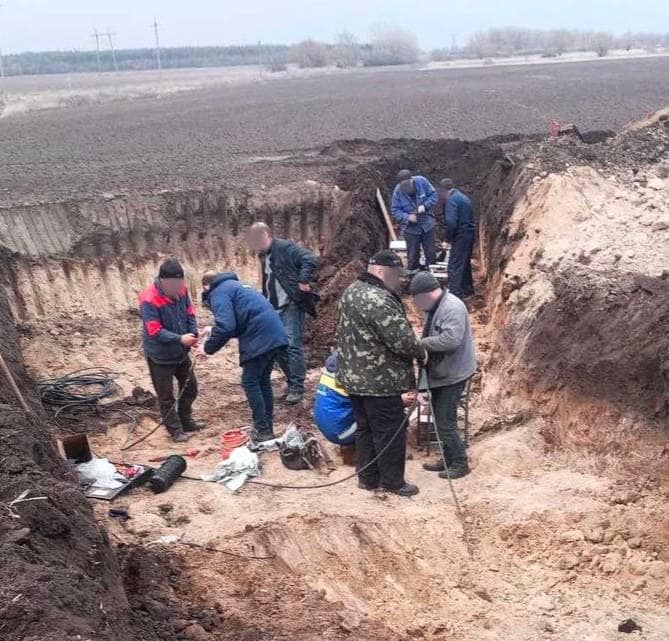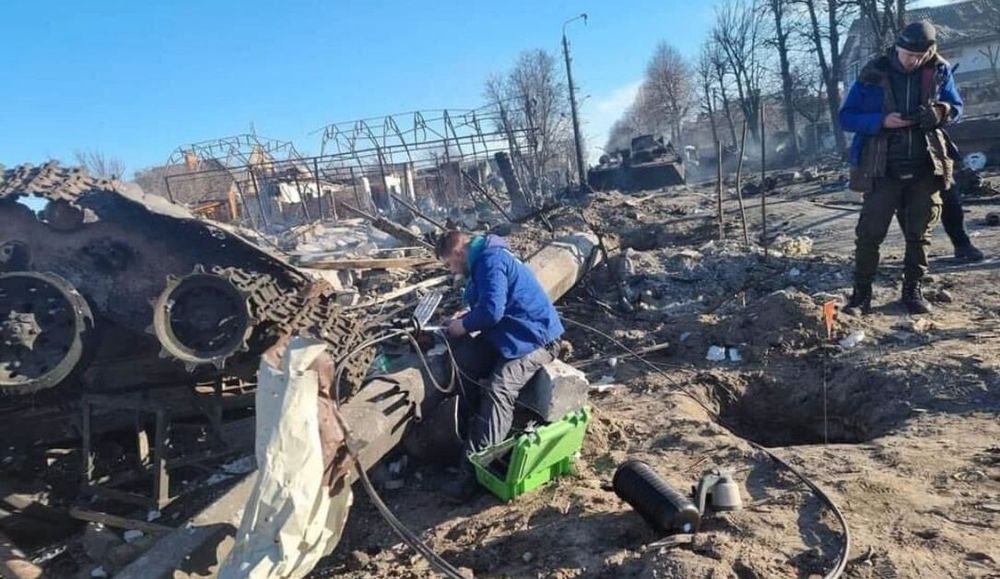Meet the frontline workers keeping the internet online in Ukraine
On the morning of Feb. 24, Ukrainian Oleksandr Stadnyk woke up to the sound of explosions.
“At first I didn't believe it. I got up, looked out the window, and realized that everything was bad,” said Stadnyk, head of the Chernihiv technical center of Vodafone, Ukraine’s second-largest mobile carrier.
The Russian invasion had just begun, and so had Stadnyk’s fight to keep Ukraine’s internet online.
Stadnyk lives in the northern Ukrainian city of Chernihiv, which has come under heavy shelling by Russian forces over the past few weeks. The attacks on the city didn’t stop even when Moscow promised to scale down its military operations in the region during the peace talk in Ukraine on March 29.
Stadnyk, his wife, and two kids fled the city, which was left without electricity, gas, running water, and enough food supply after the attacks. The city’s internet connection has also been disrupted “amid intense Russian bombardment,” according to NetBlocks, a London-based firm that monitors internet activity.
Confirmed: A significant disruption to internet connectivity has been registered in #Chernihiv, northern Ukraine; the incident comes amid intense Russian bombardment despite talk of a reduction in military operations targeting the region
— NetBlocks (@netblocks) March 30, 2022
Background: https://t.co/S0qJQ7CbNv pic.twitter.com/wHBUcV0Q2f
Fixing the disruptions of the network has been Stadnyk’s job at Vodafone for over 10 years—he worked his way up to the position of the technical center director in the Chernihiv region.
With the outbreak of war, Stadnyk joined the ranks of the so-called “invisible heroes” who repair damaged internet infrastructure to keep people connected even in the temporarily occupied regions of Ukraine.
“For many Ukrainians internet has become the last ray of hope, allowing them to stay in touch with relatives in different cities or use online government services,” Stadnyk said in a recent interview with The Record.
During the war, Ukrainian technicians like Stadnyk are risking their lives to keep the country connected to the internet.
The Record asked them how they’re doing it.
Daily routine
The work of Ukrainian engineers restoring communication lines has never been easy. "We worked day and night even before the war,” said Kyrylo Popov, technician at Ukrtelecom, a major provider of mobile and broadband internet in the country. “Now our days have become a little busier,” he told the Record.
Popov lives in Dnipro, a city of about one million people in southeast Ukraine. It is the home of the world-famous spacecraft design bureau Pivdenne and the giant spaceship factory Pivdenmash.
Since the start of the invasion, Dnipro has suffered only a couple of missile strikes, including one that severely damaged its airport and completely destroyed its oil depot.
According to Popov, the engineers’ work is mostly hindered by curfews that prohibit citizens from moving around the city without special permits.
“Our working day usually starts at 6 a.m. and lasts until 10 p.m., but it can be interrupted by a curfew that usually starts at 6 p.m. At this time the city is run by the military,” Stadnyk explained. “This slows down the process of restoring the internet access,” Popov added.
To continue working on the major disruptions even during the curfew, the engineers ask for the permission of the territorial forces “and work as much as we need to,” said Stanislav Lobko, Ukrtelecom manager from Odesa, the port city in the south-west of the country.

Another problem, according to Stadnyk, is access to damaged infrastructure. Some of it is trapped under rubble or technicians simply cannot go there because of the shelling.
During the COVID-19 pandemic, Ukrainian internet providers learned to control and manage their networks remotely, said in an interview with The Record Ukrtelecom’s chief technical officer Dmytro Mykytiuk.
Stadnyk agrees. While he cannot go to his hometown Chernihiv, encircled by Russian troops, he can remotely monitor which networks have been damaged and what caused a problem. “We can spot a problem with 90% accuracy,” he said.
Then he decides whether to restore the internet remotely or send a repair crew to the site.
“Everyone helps us, even those people who do not work in the company,” Stadnyk told The Record.
Dangerous job
To bring the internet back to places damaged by Russia’s attacks, Ukrainian engineers have to work in poor light, in bad weather, cold, and under the constant risk of being killed by an enemy missile.
Ukrtelecom and Vodafone said they had no casualties at work, although some employees had to flee the shelling, leaving their car and equipment at the repair site; one Ukrtelecom employee was killed when a Russian missile hit his house.
Ukrainian internet service providers who spoke to the Record said that they are trying to avoid unnecessary risks and are not sending their staff to places of active hostilities. “Safety of our employees is above all. We can't risk their lives,” Lobko said.
Some are willing to take the risk on their own.
“When the war broke out, I decided that I wanted to do something useful every day that would bring us closer to victory,” Stadnyk said.
People understand the full responsibility of their work and do not avoid it, according to Popov. “They know how valuable and necessary internet connection is for every Ukrainian,” he added.
Every day, Ukrainian internet providers record about 130 cases of network damage, according to the state communication and information protection service.
But while Russia continues to drop bombs on Ukraine, its internet specialists descend into trenches flooded with water, manually dig multi-meter pits to weld cables thinner than human hair, and enter dilapidated buildings that have just been hit by attacks to connect their customers to the internet.
Rival telecommunication companies that used to fight each other in silent war are now working together sharing their networks and personnel. If Ukrainians have problems with mobile communication and internet access, they can use national roaming that allows customers to move to another operator’s network.
“People are very united, I have never seen such a thing”, according to Stadnyk. “This is why we will win.”
Long battle
The battle for the Ukrainian internet goes beyond the front line—Ukrainian operators have been preparing their network for the possible attack for years, according to Yurii Shchyhol, head of Ukraine’s state service responsible for information infrastructure protection.
“Over the past two years, operators have made significant investments in reserving lines and ensuring their recovery as soon as possible,” Shchyhol wrote on Telegram.
Ukrtelecom told the Record that its external channels to the global internet cross Ukraine’s western border, while Ukrainian operator Lifecell told the Wall Street Journal that its crews spent about two months before the invasion moving some equipment out of eastern areas to the west, where millions have since relocated.
About 10% of Lifecell’s roughly 8,500 cellular base stations have been knocked offline since the invasion.
Although it is impossible to disconnect Ukraine from the internet by cutting a cable, Russia will not abandon its plans to destroy Ukraine's communications infrastructure, according to Shchyhol.
“It is an important part of conveying truthful information about what is happening in the country, including to the temporarily occupied territories,” he said.
| How can Russia disrupt communication services in Ukraine? — The injection of unwanted wireless signal into the original signal. It may result in a temporary loss of wireless signals, poor receiver performance, or bad quality of output by the electronic equipment. — Channel interference. It influences the performance of wireless communication systems. — Overload attacks, like DDoS attacks. They are designed to overwhelm the available capacity of the infrastructure or absorb so much capacity that the negative influence on the service is notable. — Attacks on physical components – cables, switches, routers, and network centers. Source: Malwarebytes |
High hopes
The situation in various Ukrainian cities changes every day: once peaceful Lviv—a haven for people and businesses fleeing the eastern and central part of Ukraine—was attacked on March 26 causing a significant drop in connectivity on internet provider Komitex, according to NetBlocks.
But changes on the ground don’t affect the work of Ukraine’s network engineers. “We work, as usual, enjoying every peaceful day,” according to Lobko. His hometown, Odesa, is far from Russia’s main battlefield, so he feels safe.
It is different for Stadnyk, whose native Chernihiv is severely damaged by Russians. Their troops targeted civilian infrastructure—hospitals, schools, a cinema, historic buildings.
“We had a very beautiful city, so as soon as we win—I’ll go home,” Stadnyk said.
On the evening of March 30, NetBlocks reported that internet connectivity in Chernihiv has been restored and now stands at around 60% of pre-war levels.
Ukrainian network engineers have managed to bring back the internet even during heavy bombardment by Russia. They understand that their work can affect hostilities on the ground.
“We have a ‘small front’—we work in the rear, united and for the sake of the result,” according to Popov.
Daryna Antoniuk
is a reporter for Recorded Future News based in Ukraine. She writes about cybersecurity startups, cyberattacks in Eastern Europe and the state of the cyberwar between Ukraine and Russia. She previously was a tech reporter for Forbes Ukraine. Her work has also been published at Sifted, The Kyiv Independent and The Kyiv Post.



